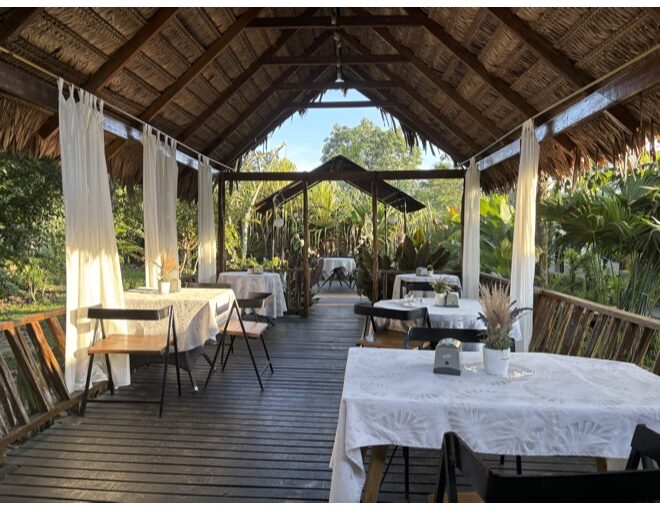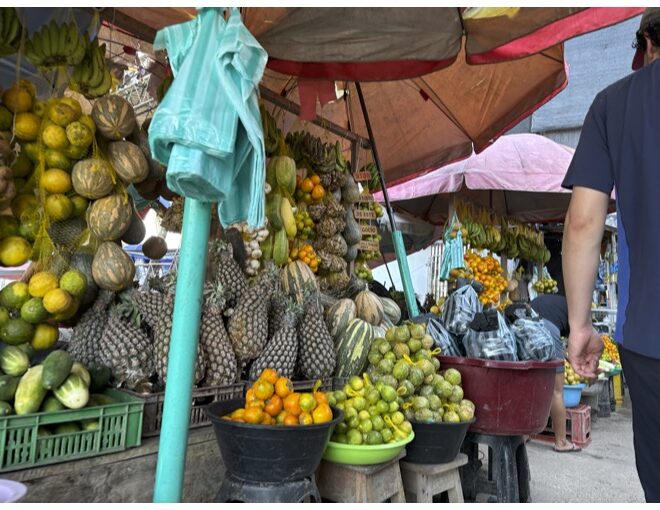
Diversity within Colombia: The Amazon Rainforest
Brian Chica-Herrera (CAS ’28)
GRIP: FinTech in Medellin
One of the most interesting parts of Colombian culture shock this summer was my experience being in the Amazon’s rainforest and meeting its people. For four nights, I toured the river-region of the Colombian Amazonas department. There, I stayed in its capital city of ~35,000 and then briefly lived on an indigenous reservation of the Tikuna people.

In both the developed capital and the Tikuna village, I experienced a whole new way of life that did not depend on my way of life at all. Sure, in the Tikuna village of ~700, I saw teenagers blasting Drake music and a bar hosting national beers, but other aspects of culture felt entirely new. Trying Amazonian food, for example, was my favorite part of the trip because there were multiple meals where I had never eaten any of the ingredients before. And many of us have preconceived notions of Amazonian food including bugs and vegetables, which to some extent is very true, but at the same time, there were meal staples created from plants I had never even heard of before. For example, in the farmland of the Tikuna village, the process of creating tucupí was explained to me as a lengthy, arduous extraction of juices from a poisonous branch of yuca. At first, I had limited faith in the idea of eating the derivative from a poisonous root, but the final product that I spread on my meal was unlike anything I had ever had before… The experience was eye-opening to me about the level of intricacy and expertise involved in these groups’ daily cuisine.

What struck me most was how quickly these cultural experiences reshaped my perspective on what it means to belong in Colombia. I had grown up thinking of “Colombian identity” through the lens of cities like Medellín and Bogotá, yet in the Amazon I realized how layered and diverse the country really is. Sharing meals with the Tikuna, learning about ingredients I had never imagined, and witnessing how traditions adapt while staying rooted in place, reminded me that culture is not static. It deepened my appreciation for Colombia as a homeland to many different peoples — each with its own wisdom — and made me more eager to continue engaging beyond the urban centers I was familiar with.
*Note: One of my recommendations before visiting anywhere incredibly new is reading old/outdated perspectives or books about that place. For example, I read Jules Verne’s Eight Hundred Leagues on the Amazon which explored early colonial interactions with the Tikuna people, and earlier, less-developed life in the region.
Read Related Blogs

5AM Snorkels, Boat Life, and Doing It for the Plot
Penn Global Seminar: Darwin’s Laboratory: History, Philosophy, Evolution and Social Ecology in the Galápagos Archipelago Allison, one of the Fall 2025 Penn Global Seminar Correspondents, shares her experience abroad during the…

Heading to Taiwan with Curiosity (and No Plan)
Penn Global Seminar: Energy Security and Geopolitics Chenyao, one of the Fall 2025 Penn Global Seminar Correspondents, shares her experience abroad during the Winter Break. Follow along with the group of…

Hiking, Healthcare, and a Suitcase that Won’t Zip
Penn Global Seminar: Health and the Healthcare System in Chile Anya, one of the Fall 2025 Penn Global Seminar Correspondents, shares her experience abroad during the Winter Break. Follow along with…